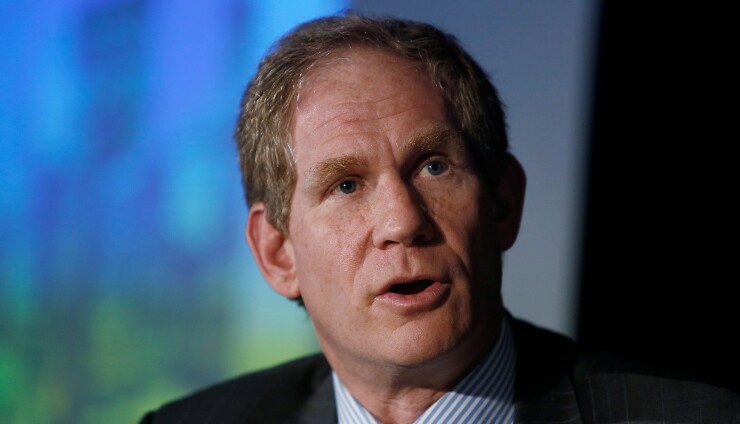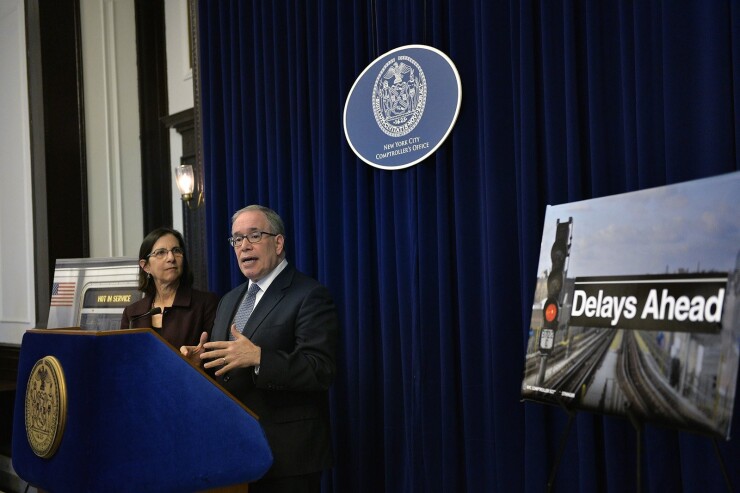Transit watchdog groups continue to push New York's Metropolitan Transportation Authority to amend its under-the-radar emergency contractor debarment rule.
While the rule drew little mention at Wednesday's busy and disruptive board meeting, opponents argue that its harshness could hinder contractor bidding and compromise projects under the authority's proposed $51.5 billion, five-year capital program, which a state panel is reviewing.

Board members passed the authority's $17 billion operating budget and four-year financial plan by a 9-3 vote, and heard the findings of a forensic audit from consulting firm Crowe LLP about the MTA's capital program processes.
Demonstrators frequently interrupted the meeting, objecting to the MTA's hiring of 500 additional police officers Two people tried to charge the board members' area. Seven people were ejected and police issued five disorderly conduct summonses, according to MTA communications director Tim Minton.
The MTA is one of the largest municipal bond issuers, with $44 billion of debt including special credits.
State lawmakers enacted a debarment rule as part of the state fiscal 2020 budget and amid a spate of contractor-related problems on major projects. The MTA went further in a board action behind closed doors in May, automatically banning contractors from doing business with the authority if their projects exceed budgets or schedules by more than 10%.
New York City Comptroller Scott Stringer, in a scathing
"Bombardier consistently failed to produce acceptable work, meet project milestones and correct critical structural defects in a timely manner — resulting in a three-year delay," Stringer said. "MTA failed to properly oversee the contract, waiting years before exercising critical enforcement authority."
The MTA's New York City Transit division contracted with Bombardier in 2012 for the design, production and delivery of 300 R179 subway cars.
Officials from Bombardier and Siemens AG, which have a joint-venture deal to install a positive train control remote safety mechanism for commuter rail, told the board on Monday that despite past problems, they expect to meet a December 2020 federal mandate for PTC installation for Long Island and Metro-North railroads.
"We agree that the MTA must take aggressive steps to ensure that projects come within budgets and on-time, and that contractors must be held accountable; however, mandatory debarment is bad policy," said Lisa Daglian, executive director of the watchdog Permanent Citizens Advisory Committee to the MTA.
The debarment rule expired Tuesday, but has had several extensions since its enactment and another could be in store.
"We had hoped there would finally be an opportunity for public discussion around the rules," Daglian said.
"Given the scope and complexity of the FY20-24 capital plan, getting the rules right is more important than ever, or we face the potential of increased costs and timelines built in by a dwindling set of contractors willing to do business with the MTA," she added. "Contractors must be held accountable, but so, too, must the MTA for the decisions it makes."
Also opposing the debarment rule are Reinvent Albany, Tri-State Transportation Campaign, Citizens Budget Commission, Riders Alliance and TransitCenter. In a letter to board members, they cited revelations at a New York City Transit committee meeting in November that three vendors did not submit proposals on a $38.8 million design-build contract for station accessibility upgrades, citing "excessive risk" because of contract terms that included debarment.
Crowe's consultants, while calling the MTA's capital program processes consistent with industry leading practices, cited "significant deficiencies" in compliance and control.
Crowe called on the MTA to modernize its 20-year needs assessment report; find efficiencies and cost savings; and improve capital project delivery. It released a draft on Wednesday and expects to release the full 85-page report by week's end.

The auditors, led by Crowe partner Bert Nuehring and director Erik Nylund, compared the MTA's performance with peer groups Bay Area Rapid Transit District, Chicago Transit Authority, Massachusetts Bay Transportation Authority, Transport for London and Washington Metropolitan Area Transit Authority.
State lawmakers called for the $900,000 audit along with the budget.
MTA officials spun the report as a positive as they await state review panel approval of its record $51.5 billion capital program for 2020 to 2024.
"The bottom line is that our capital program makes sense," chief development officer Janno Lieber told reporters.
Veronica Vanterpool, David Jones and Robert Linn — all appointees of Mayor Bill de Blasio — voted against the operating budget.
According to Vanterpool, too many question marks linger. "The assumptions have gotten bolder and grander than they have in the past, and I find that incredibly problematic," she said at her final meeting.
Vanterpool will become the chief innovation officer of Delaware Transit Corp.





